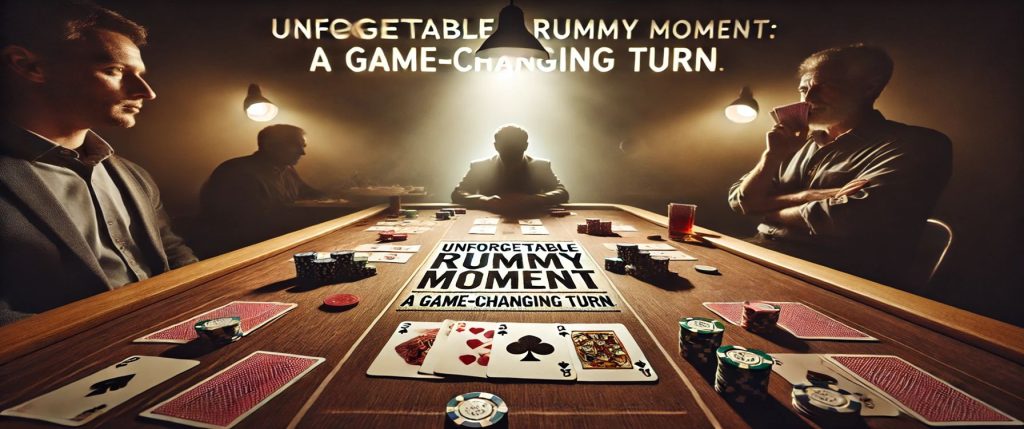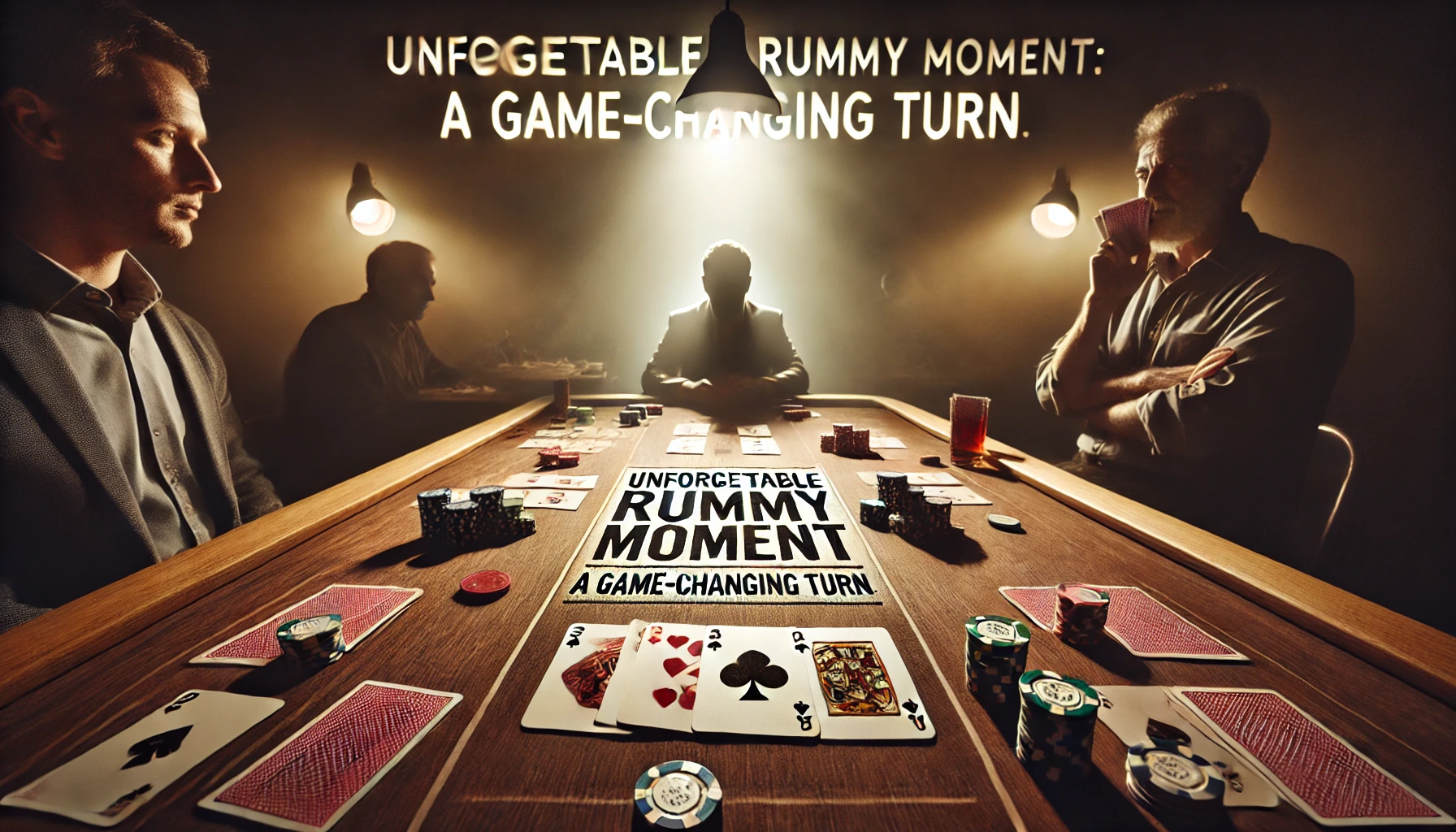Unforgettable Rummy Moment: A Game-Changing Turn

The Game-Changing Turn in Rummy: An in-depth look At the game of rummy, the atmosphere is frequently tense with strategy & expectation. Gathered around the table, players each bring a distinct strategy to the game. Play is cautious in the early rounds as players carefully manage their own hands while evaluating the advantages and disadvantages of their opponents. As players draw and discard cards—each move carrying the possibility of repercussions—the stakes are high & the tension is obvious.
The psychological battle that takes place during the build-up to a pivotal turn is just as important as the cards at hand. In order to gauge reactions and try to figure out the motivations behind each discarded card, players play subtle mind games. The suspenseful atmosphere grows stronger as the game goes on. Though they are only temporary, players start to form alliances as they plot against a common enemy and share brief moments of companionship. The players are more conscious that one mistake could spell their doom as the stakes increase with every round.
The tension increases as the players approach a crucial moment where a single, decisive move could tip the scales of power. The outcome is up in the air as strategy and opportunity collide in this pivotal moment. The tension builds to an almost intolerable degree as the game approaches its climax. Each draw becomes a high-stakes situation because players are acutely aware of how few cards are left in the deck. As players look at one another, their expressions reveal nothing but hint at everything, and the air is heavy with unsaid words.
The stakes are about pride, reputation, and the rush of outwitting one’s rivals, not just about winning or losing. Players analyze each move & examine each discarded card in an effort to forecast their opponents’ next moves. One could only describe the electric atmosphere created by this increased awareness as exhilarating. Players need to navigate their strategies precisely in this high-stress environment.
Others may decide to play more aggressively, discarding cards that might help their opponents, while others may decide to play conservatively, holding onto their cards & waiting for the ideal opportunity to present itself. As the players consider their options, the tension is evident because they know that one poor decision could spell disaster. As the crucial moment draws nearer, the tension increases—who will initiate contact? Who will take advantage of the situation?
A dramatic turn that could change the outcome of the game is set in motion. There are many variables to consider when a player must make a choice that could change how the game unfolds. Every player needs to think about both their hand & how their actions might affect their opponents. Players must balance the risks and rewards in this situation, which is frequently rife with uncertainty.
A player may be tempted, for example, to draw a card that completes a set, but they must also think about whether doing so would give their opponents too much information. A careful balancing act between ambition & caution becomes part of the decision-making process. Also, players’ strategies can differ greatly. Some might choose a more aggressive approach, throwing away cards they think might be helpful in an effort to thwart their opponents’ strategies. While minimizing their exposure to possible threats, others might adopt a more defensive stance, concentrating on strengthening their own hand.
The decision-making process is further complicated by these disparities in approach. Players must be alert as they consider their next move, continuously evaluating and adjusting their opposition’s tactics. Because it can either lead a player to victory or defeat, this choice carries a lot of weight. One player’s pivotal move, which sends shockwaves through the table, is the moment that everything changes.
Drawing a card that not only completes a set but also thwarts an opponent’s well-laid plans is frequently the key move. A game that was once hotly contested can suddenly change drastically in favor of one player. As players rush to reevaluate their positions & strategies in light of this unexpected turn of events, the atmosphere shifts from one of cautious anticipation to outright chaos.
This one move can have far-reaching effects that go beyond just the points or sets that are immediately scored. It has the power to intimidate adversaries or motivate them to take chances they might not otherwise take. One cannot stress how psychologically damaging such a turn can be; players who were previously certain of their tactics may start to doubt and hesitate.
Some may adopt a more defensive stance as they struggle with this new reality, while others may become excessively aggressive in an effort to regain control. As a result of the irreversible change in the game’s dynamics, a series of events will impact all future decisions made at the table. Depending on their personalities and styles of play, players’ responses to a game-changing turn can differ greatly.
Some might react by displaying obvious annoyance or incredulity, while others might hide their feelings behind a composed exterior. The game is made more complex by this emotional range; players’ reactions can affect both their own and their opponents’ strategies. A player who reacts angrily, for example, might unintentionally expose their weaknesses, which others could take advantage of in later rounds. On the other hand, this could be a chance for some players to reorganize & reassess their tactics. After taking a deep breath, they might reevaluate where they are at the table and think about the best way to offset their rival’s advantage. This response may result in players forming unanticipated alliances or refocusing their efforts on self-preservation or uniting against a shared threat.
An environment where anything can happen as players decide their next course of action is created by the rich and varied emotional landscape that follows a game-changing turn. After a turn that changes the game, the effects are frequently felt for the rest of the game, impacting not only individual tactics but also group dynamics at the table. Once-confident players may start to question their choices, which could make them hesitant in subsequent rounds.
This change may open the door for more aggressive players who look for weaknesses and take advantage of them. As players adapt their tactics to this new reality, they also have to deal with the psychological effects of seeing such a significant change in power. Also, this crucial point may influence players’ approaches to subsequent games in the long run. Whereas those who won might grow complacent or overconfident, those who lost might examine what went wrong and try to improve their tactics for the future. Future interactions at the table can be shaped by the lessons learned from this pivotal turn, which can affect everything from card selection to player relationships.
This moment essentially acts as a catalyst for future changes in players’ strategies as well as a turning point in the game as it exists now. Beyond simple tactics, the lessons learned from a game-changing turn go deeper into themes of adaptability, resilience, and strategic foresight. A crucial lesson learned is the value of maintaining flexibility in one’s strategy. When confronted with unforeseen developments, a player who adheres too strictly to an initial strategy may find themselves at a disadvantage. On the other hand, people who are prepared to change course and adjust to new situations are frequently more successful.
This flexibility includes reading opponents and knowing when to take chances or play it safe, in addition to changing tactics. At the table, emotional intelligence is a key lesson as well. Whether it’s overconfidence following a victory or frustration following a loss, players who are able to control their emotions typically perform better under pressure.
Understanding how emotions affect judgment enables players to stay focused and clear-headed even under pressure. These lessons ultimately serve as a reminder that Rummy is a game of deftly navigating intricate social dynamics & strategic challenges rather than merely being a game of chance. A pivotal turn frequently leaves a lasting impression that extends beyond specific games; players talk about it long after the cards have been put away. Stories about such moments are passed down through friends and other fans, serving as inspiration or warnings for upcoming generations of gamers.
These stories are not only entertaining, but they are also effective teaching resources that distill important lessons about human nature and strategy in competitive environments. These fabled turns eventually take on a life of their own in rummy culture, serving as symbols for more general concepts like taking risks versus exercising caution or working together versus competing. Reinforcing the notion that Rummy is as much about psychological warfare as it is about card play, they remind players that every match has the potential for dramatic changes and unexpected outcomes. Game-changing turns are thus incorporated into the history of Rummy, enhancing its story and guaranteeing that future generations will continue to gain knowledge from their predecessors.
Conclusion: Gaining insight into the complexities of a crucial turn in Rummy can help one better understand psychology, strategy, and interpersonal relationships in competitive settings. Every element adds to a rich experience that goes beyond simple gameplay, from creating tension before crucial moments to examining choices made in reaction to those changes. Players develop new abilities and a greater understanding of this classic card game as they think back on these occasions, both individually and as a group.
